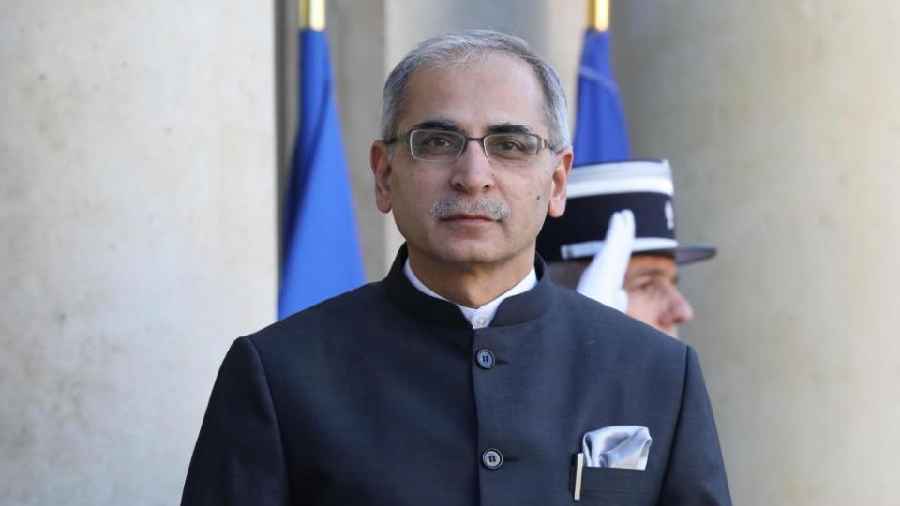As India steps up efforts to build consensus on a joint communique at the G20 foreign ministers meeting, Foreign Secretary Vinay Kwatra on Wednesday chose not to "prejudge" any outcome on it but said the Russia-Ukraine conflict will be an important point of the deliberations.
There have been apprehensions about the lack of consensus on a joint communique at the G20 foreign ministers' meeting in the wake of the Russia-China combine and the West hardening their respective positions on the Ukraine conflict.
Ahead of Thursday's crucial meeting of the G20 in the national capital, Kwatra said the leaders would clearly discuss the current situation between Russia and Ukraine and noted that the impact of the conflict on food, energy and fertiliser security for the world would be among the key focus areas for the Indian presidency.
"I do not think it would be really correct for me to prejudge the outcome of the G20 foreign ministers' meeting...We are very clear that the Foreign ministers should focus on all the priorities that are currently relevant in the global context," he said.
India will host the G20 foreign ministers and other guests at a gala reception on Wednesday evening and the main deliberations will take place on Thursday.
"Given the nature and the developing situation in the Russia, Ukraine conflict, naturally that would be an important point of discussion during the G20 foreign ministers meeting," Kwatra said.
External Affairs Ministry Spokesperson Arindam Bagchi, responding to a question on Russia and China not agreeing to paragraphs three and four in the G20 Chair's Summary and Outcome Document issued after a meeting of the grouping's finance ministers and central bank governors in Bengaluru, said it is for the two countries to explain.
The paragraphs were taken from G20 'leaders' declaration at the Bali summit in November and one of them contained the formulation that "Today's era must not be of war".
"You need to ask them whether they no longer stand with the text from Bali," Bagchi said.
The foreign secretary also referred to Prime Minister Narendra Modi's statement in Samarkand in September that "this is not an era of war".
Kwatra also noted that Modi, in his conversations with the world leaders, including that of Russia and Ukraine, had clearly stated that dialogue and diplomacy are the way forward to resolve the conflict.
In his bilateral meeting with Putin in Uzbekistan on September 16, Modi said "today's era is not of war" and nudged the Russian leader to end the conflict.
The foreign secretary also recalled India's contribution in arriving at the Bali declaration.
"What foreign ministers would discuss tomorrow, what understanding they would arrive at on this subject, whether that understanding would be to the exclusion of the other agenda items etc are the issues for the foreign ministers to decide," Kwatra said.
He said there are 40 delegations, including those from G20 countries, guest nations and international organisations, participating in the meeting on Thursday.
The guest countries are --Bangladesh, Egypt, Mauritius, the Netherlands, Nigeria, Oman, Singapore, Spain and the United Arab Emirates.
"Surely, it will be one of the largest gatherings of foreign ministers hosted by any G20 presidency," Kwatra said.
The foreign ministers are also likely to discuss ways to deal with falling economic growth, increasing inflation, lower demands for goods and services as well as increasing prices of food, fuel and fertilisers.
However, the major flashpoint between the West and Russia-China is expected to be the Ukraine conflict.
Russia on Sunday alleged that the G20 finance ministers' meeting in Bengaluru ended without a joint communique because of the "confrontational" approach towards Moscow by the "collective West" over the situation in Ukraine.
Asked about Japan's foreign minister Yoshimasa Hayashi deciding to skip the G20 meeting, the foreign secretary said India and Japan have enjoyed starling cooperation when it comes to deliberations within the G20 setting.
"We understand that the Japanese foreign minister himself is not able to come because of domestic compulsions. But we are looking forward to a very active participation, active support, active discussions and consultation with the Japanese delegation," he said.
The foreign secretary said the meeting will have two sessions. The first session will focus on multilateralism, issues related to food and energy security, and development cooperation.
The second session will focus on new and emerging threats like the challenge of terrorism and global skill mapping among others.
Kwatra said the broad areas for discussion will be inclusive and resilient growth, progress on the sustainable development goals, green development, technological transformation and reforming the multilateral institutions.
"Clearly, the foreign ministers would also focus on the ongoing situation between Russia and Ukraine...And more importantly, among the G20 members when they meet tomorrow and discuss it, what is the understanding that they develop," he said.
He said the impact of the Ukraine conflict on the rest of the world, particularly the economic impact and challenges that the developing countries face because of the situation are equally important issues to focus on.
The foreign secretary said that questions relating to food, energy and fertiliser security and the development cooperation templates as well as new and emerging threats including the problem of terrorism are important subjects for India.
The G20 or Group of 20 is an intergovernmental forum of the world's major developed and developing economies.
The members represent around 85 per cent of the global GDP, over 75 per cent of the global trade, and about two-thirds of the world population.
The grouping comprises Argentina, Australia, Brazil, Canada, China, France, Germany, India, Indonesia, Italy, Japan, the Republic of Korea, Mexico, Russia, Saudi Arabia, South Africa, Turkey, the UK, the US and the European Union (EU).
Except for the headline, this story has not been edited by The Telegraph Online staff and has been published from a syndicated feed.











